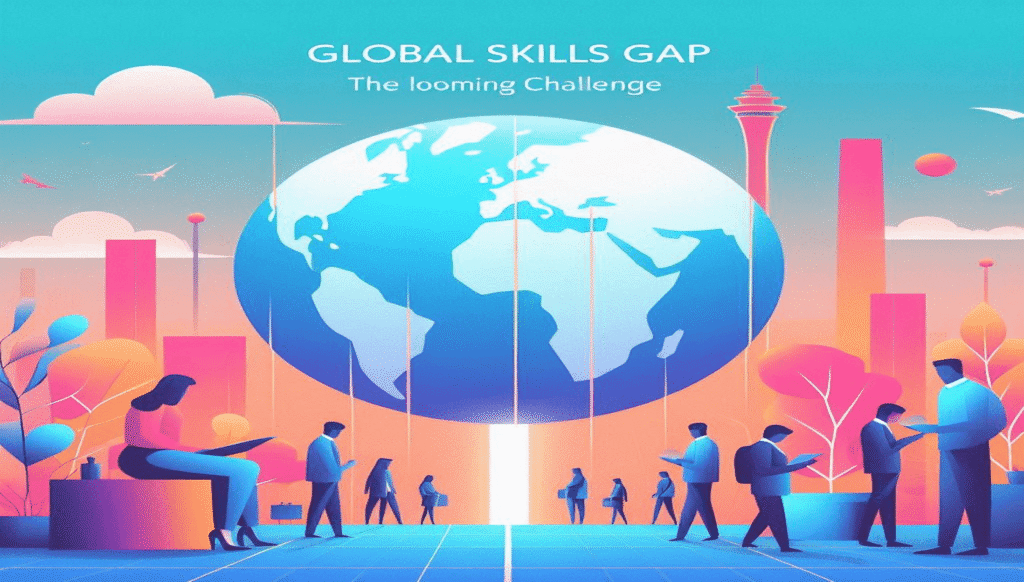
The world is in constant change, isn’t it? Technological advancements are reshaping industries at breakneck speed, and amidst this whirlwind of innovation, a critical issue continues to cast a long shadow: the global skills gap. This pervasive mismatch between the skills employers need and the skills the workforce possesses isn’t just a minor inconvenience; it’s a major barrier to business transformation globally. As we navigate the complexities of the 21st century, understanding and addressing this gap has become paramount for successful talent acquisition and sustained organizational growth.
Global Skills Gap: Identifying the Skills That Matter in Today’s Demand Landscape
So, what exactly are these elusive skills that businesses are clamou ring for? The reports paint a clear picture of a rapidly evolving demand landscape. Leading the charge is the relentless rise of Artificial Intelligence (AI) and its various iterations, most notably Generative AI (GenAI). The launch of ChatGPT in 2022 ignited a global race toward AI literacy, and the numbers speak volumes: global GenAI course enrollments on platforms like Coursera witnessed an astounding 1,060% year-over-year increase. This surge underscores how learners are actively preparing for AI’s transformative impact on their careers. From prompt engineering for ChatGPT to introductory courses on GenAI, the appetite for foundational AI skills is undeniable.
But it’s not just about creating AI; it’s also about protecting the digital realm it inhabits. With a 75% surge in cyberattacks in Q3 2024 and the increasing sophistication of these threats, cybersecurity skills have surged into the fastest-growing skills list. In my opinion, this isn’t surprising. As businesses become increasingly reliant on digital infrastructure and generate massive amounts of data (a significant portion of which, alarmingly, isn’t even being backed up), the demand for professionals who can identify, neutralize, and respond to threats is only going to escalate. This urgency is further amplified by a nearly five-million-person shortage of cyber professionals globally.
Beyond the cutting edge of AI and the crucial domain of cybersecurity, a broader spectrum of tech skills remains in high demand. This includes fundamental aspects like network planning & design and the use of Security Information & Event Management (SIEM) to bolster security posture. Furthermore, technological literacy itself is becoming a core expectation across more than 9 in 10 jobs, encompassing everything from basic computer usage to more advanced digital proficiencies.
Interestingly, the “soft” skills, often referred to as human skills, are gaining even greater prominence in this AI-augmented world. While machines take on repetitive and analytical tasks, employers are increasingly seeking individuals who possess emotional intelligence, creativity, negotiation, active listening, empathy, and persuasive communication.
Analytical thinking consistently ranks as the most sought-after core skill, along with resilience, flexibility, agility, leadership and social influence, and creative thinking. As AI becomes more integrated into the workplace, these human qualities become key differentiators, ensuring ethical decision-making and effective collaboration in diverse teams.
In the business domain, beyond general communication and risk mitigation, there’s a growing emphasis on human rereports (HR) technology, reflecting the need for tech-savvy HR professionals to manage talent in a digital age. Furthermore, sustainability skills like waste management and business continuity planning are increasingly prioritized, particularly by younger generations concerned about climate change.
Global Skills Gap: Regional Rhythms and Variations in Skill Demand Worldwide
The global skills gap isn’t a monolithic entity; it pulsates with regional variations, each with its unique rhythm of demand and availability. In Latin America and the Caribbean, there’s evidence of improved technical skill rankings. Countries like Colombia and Mexico are seeing high engagement in GenAI courses, while learners in Peru focus on skills like culture and resilience.
Europe, despite its commitment to digital transformation and the development of the AI Act, faces a significant hurdle: 70% of European businesses view the lack of digital skills as a major obstacle to investment, and a staggering 40% of adults lack even basic digital skills. This digital deficit needs urgent attention to fully capitalize on the region’s ambitious Digital Decade goals.
Across the Asia Pacific, CEOs are accelerating AI investments, leading to a surge in AI and cybersecurity course enrollments. However, the region faces the monumental challenge of digitally skilling 5.7 billion people by 2025. While Singapore strategically focuses on future-oriented skills like blockchain and machine learning, supported by initiatives like the SkillsFuture credits program, other countries like Bangladesh, Myanmar, and the Philippines still exhibit noticeable gaps in tech and data science skills.
In South-Eastern Asia, employers are heavily focused on upskilling their existing workforce. India, with its rapidly expanding digital access, sees increased demand for Big Data Specialists and AI and Machine Learning Specialists.
Sub-Saharan Africa grapples with significant transformation barriers, including widespread skills gaps. In South Africa, while there’s potential for significant job creation in the digital sector, a pressing need exists to develop a skilled domestic workforce in digital and ICT. Learners are focusing on business skills relevant to roles like IT project manager and operations manager, with mobile devices being the primary mode of learning. Nigeria anticipates network and cybersecurity skills to be among the fastest-growing in demand as it develops its Business Process Outsourcing (BPO) industry.
Even in developed economies like North America, where the focus is on developing a skilled and inclusive workforce, challenges persist. In the United States, despite a focus on technical skills like SQL and Python, nearly one-third of US workers lack foundational digital skills, disproportionately affecting workers of colour. The growing need for STEM professionals also outpaces the number of graduates in engineering and computer science. Canada sees learners focusing on a diverse range of skills, from technical to communication-focused, like storytelling and social media.
In the Middle East and North Africa, a strong year-over-year enrollment growth in GenAI courses signals a growing interest in AI and machine learning. Turkey, for example, must reskill a significant portion of its workforce to meet future demands, with learners over-indexing in machine learning algorithms.
These regional nuances underscore a critical point for global talent acquisition strategies: a one-size-fits-all approach simply won’t cut it. Understanding these diverse demands and availability is crucial for organizations seeking to build globally competitive teams.
Global Skills Gap: The Indispensable Role of Continuous Learning and Upskilling
Given the rapid pace of technological change and the evolving demands of the job market, the necessity of continuous learning and upskilling cannot be overstated. For employees to remain competitive and for organizations to thrive, a commitment to lifelong learning is no longer a luxury; it’s a fundamental requirement.
The reports indicate that employers recognize this imperative. A significant 85% of employers surveyed plan to prioritize upskilling their workforce. This investment in workforce development and micro-credentials is driven by the fact that 65% of companies report talent shortages. Looking ahead to 2030, a substantial portion of the global workforce will require reskilling and upskilling to adapt to changing roles and the integration of new technologies.
I believe this proactive approach to learning is essential. Organizations that foster a culture of continuous learning empower their employees, enhance their agility, and ultimately secure their future success. This involves developing comprehensive learning programs that engage, retain, and develop employees.
Furthermore, governments have a vital role to play in building comprehensive skills development programs that equip job seekers with the skills critical for employment and economic growth.
Higher education institutions, too, must adapt by delivering industry-aligned curricula that attract students and improve their employability. The rise of online learning platforms like Coursera plays a crucial role in making high-quality learning accessible to a global audience. The blended learning model, combining online and in-person elements, is increasingly recognized as a highly effective approach.
Bridging the Divide: Talent Acquisition Strategies for a Skills-Scarce World
How can organizations effectively navigate this landscape of skills gaps and talent shortages? Traditional talent acquisition methods may no longer be sufficient. A shift in mindset and strategy is needed.
One crucial approach is hiring for potential rather than solely for existing skills. By focusing on adaptability, problem-solving abilities, and a growth mindset, organizations can tap into a wider talent pool and invest in on-the-job training to bridge specific skill gaps. This also involves creating more gig-based work to encourage versatile skill-building and enterprise-wide talent sharing.
The reports also highlight the growing importance of skills-based hiring, with some companies planning to remove degree requirements to expand their talent pool and improve skills matching. This signifies a recognition that practical skills and competencies can be more indicative of future job performance than formal educational qualifications. Skills assessments and psychometric tests are also gaining traction as methods for evaluating candidates’ abilities and potential.
Furthermore, organizations are increasingly looking to tap into diverse talent pools and implement targeted recruitment, retention, and progression initiatives. Supporting employee health and well-being is also emerging as a key focus for talent attraction and retention. In my opinion, fostering a sense of belonging and celebrating employee contributions are also vital elements in attracting and retaining top talent.
The adoption of AI-driven talent insights can significantly enhance strategic workforce planning. Using AI to guide entry-level candidates through the hiring process, as some companies are doing, can reduce time-to-hire and free up recruiters for more strategic work. However, it’s crucial to establish AI governance and training for the workforce to ensure responsible and ethical use of these technologies.
Global Skills Gap: The Power of Partnership for a Skilled Future
Ultimately, addressing the global skills gap requires a concerted effort and strong collaboration between industry, education, and government. Businesses need to clearly articulate their evolving skill needs, while educational institutions must adapt their curricula to align with these demands. Governments play a crucial role in investing in skills development programs, supporting reskilling and upskilling initiatives, and creating an environment conducive to lifelong learning.
The development of global skills taxonomies is also a significant step towards enabling better communication and comparability of skills data across countries. While creating a universal taxonomy presents challenges, advancements in machine learning and natural language processing are making this goal more attainable.
Realizing skill development solutions requires robust innovation and collaboration between key actors. By working together, these stakeholders can create a more agile and responsive education and training ecosystem that effectively equips the workforce with the critical skills needed for today and the future.
Here’s What I Think.
In conclusion, while global trends highlight the imperative of digital skills and lifelong learning for navigating an AI-driven future, the Indian context presents a unique set of opportunities and challenges that necessitate a significantly different approach.
The existing discourse often revolves around skilling Indian graduates for the current demands of the IT sector and the evolving technological landscape. However, given India’s demographic dividend and the specific nuances of its job market, a more radical and future-forward perspective is needed.
Instead of solely focusing on bridging the immediate skill gaps identified in reports like India’s Graduate Skill Index 2025, we could envision a future where India leverages its youthful demographic to pioneer a model of ‘distributed expertise networks’.
Imagine platforms that move beyond traditional employment, enabling graduates with specific skills, even micro-skills honed through accessible online rereports, to contribute to projects on a fractional basis across numerous organizations, both within India and globally.
These networks could be powered by AI-driven skill-matching algorithms that go beyond static resumes, dynamically assessing and deploying talent based on real-time project needs and individual competency demonstrated through verifiable digital credentials and project portfolios.
This would address the issue of underemployment by allowing graduates to gain diverse experience and earn based on their actual skills contribution, rather than solely on a fixed job role.
Furthermore, rather than solely relying on formal educational institutions to adapt their curricula, India could foster the growth of hyper-localized, community-driven ‘skill guilds’.
These decentralized learning ecosystems would focus on practical, hands-on training in rapidly evolving technologies, facilitated by industry experts and leveraging vernacular languages to overcome digital literacy barriers highlighted in the adaptation of O*NET in Indonesia.
Imagine government-backed ‘skill tokens’ that individuals can use to access these guild-based learning opportunities, fostering a culture of continuous and relevant upskilling directly tied to local industry needs and emerging opportunities beyond the traditional urban hubs. This could address the challenge of varying employability across states and college tiers by democratizing access to quality, relevant skills training.
Finally, to truly diverge from conventional models, India could champion the concept of ‘empathy-driven innovation hubs’, leveraging the emphasis on soft skills alongside technical abilities.
These hubs would encourage graduates, particularly from Tier 2 and Tier 3 colleges, to focus on using AI and emerging technologies to solve uniquely Indian challenges in areas like agriculture, healthcare, and sustainable development, emphasizing ethical considerations and social impact.
Imagine government and corporate funding directed towards ‘reverse innovation challenges’, where young graduates are incentivized to develop AI-powered solutions for grassroots problems, fostering not just job creation but also impactful societal transformation.
Sources of insights:
- Coursera’s Job-Skills-Report-2025
- Global skills gaps measurement-ILO
- India’s Graduate Skill Index 2025
- WEF Future of Jobs Report 2025
- Global Talent Trends 2024-2025

Ajay Dhage is a seasoned talent acquisition leader with over 20 years of experience in Talent Acquisition and Workforce Strategy across the oil and gas, EPC, and renewables sectors. As Talent Acquisition Lead for a global Oil & Gas EPC company in India, he manages the end-to-end hiring lifecycle for complex, multi-disciplinary projects, from sourcing and assessment to onboarding and workforce planning. Known for his customer-focused approach and innovative use of AI and data in hiring, Ajay focuses on building future-ready workforces and resilient leadership pipelines. Through ajayable.com, he shares insights, trends, and practical frameworks to help HR professionals, organisations, and recruiters excel in a rapidly evolving, competitive talent landscape.


